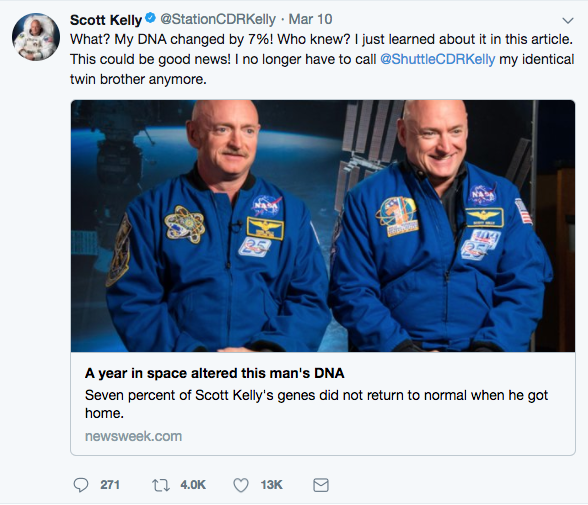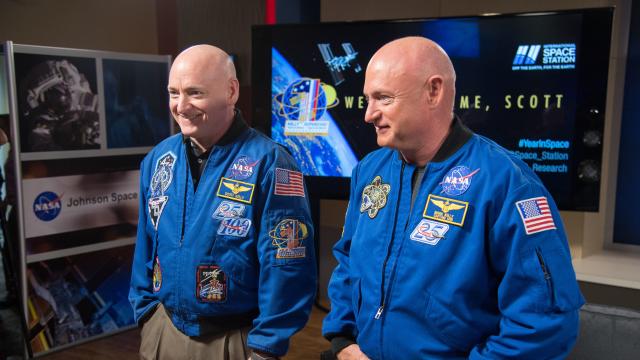It seems like pure science fiction. NASA astronaut Scott Kelly goes to space for nearly a year, comes back, and suddenly has turned into a mutant with different DNA from his twin. As Newsweek wrote, his DNA “changed in space”.
Scott and Mark Kelly, astronaut twins. Photo: NASA
Except that isn’t what happened.
The saga began last week with the Newsweek story, covering a January NASA press release with the following paragraph:
Another interesting finding concerned what some call the “space gene”, which was alluded to in 2017. Researchers now know that 93% of Scott’s genes returned to normal after landing. However, the remaining 7% point to possible longer term changes in genes related to his immune system, DNA repair, bone formation networks, hypoxia, and hypercapnia.
Kelly himself tweeted the story with the joke, “I just learned about it in this article. This could be good news! I no longer have to call @ShuttleCDRKelly my identical twin brother anymore,” referring to his twin, astronaut Mark Kelly. CNN picked up this story, and now news outlets across the world have since claimed that seven per cent of Kelly’s DNA changed in space.

Except if seven per cent of Scott Kelly’s DNA actually changed, he would be a completely different species. Humans and chimps, for example, share 96 per cent of the same DNA, a four per cent difference.
What really happened is that seven per cent of the way Kelly’s DNA is expressed changed after space travel, as Daniela Bezdan, research director of the Mason Laboratory of Integrative Genomics at Weill Cornell Medicine, explained in a tweet and confirmed in an email to Gizmodo. This is further confirmed in an expanded statement from Chris Mason, who writes that, while there were some mutations in both twins’ DNA after spaceflight, “although 93% of genes’ expression returned to normal postflight, a subset of several hundred ‘space genes’ were still disrupted after return to Earth,” emphasis mine.
This kind of change is what’s known as epigenetic, and it is something very different.
Space might affect methylation, for example – the act by which chemistry flips DNA sequences on and off, making them readable or unreadable by the rest of the cell. It’s as if DNA were an encyclopedia, with some sentences covered with black tape, making them unreadable. The trip to space could have switched some of the tape around – but the words are exactly the same.
None of the principal investigators of the NASA twin study would comment on this story’s science, noting that they plan to meet later today in order to decide on the best strategy to set the record straight. Bezdan told Gizmodo that she believed Mason would be on CNN today to discuss the preliminary results. The related papers will be published later this year.
Two of the researchers associated with the project told Gizmodo that they were not qualified to talk on the subject, but were disappointed in the rampant misinformation. Mathias Basner, University of Pennsylvania professor of sleep and chronobiology, told Gizmodo that some of the news stories are flat out wrong. Emmanuel Mignot, Stanford professor of sleep medicine, told Gizmodo the coverage was “very sad”.
So, no. Scott Kelly’s DNA is almost entirely same. But the way it’s expressed may be different.
Kristen V. Brown assisted with this story’s reporting.
